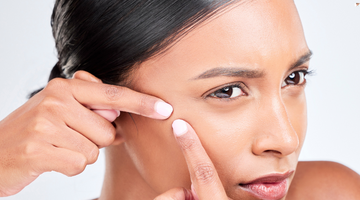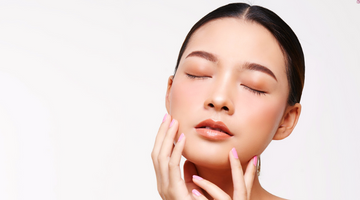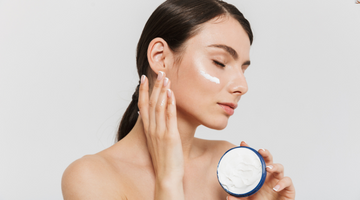We’ve all had to deal with acne trying to ruin our special days! Despite all the skincare routines and acne products being put to the test, those pesky, unwanted guests tend to show up on our faces. Everyone thinks acne is specific to them, but it has happened even to the best of us, regardless of how much we take care of our skin.
Acne is mainly a hormonal condition directly affecting androgen hormones, also known as testosterone. This hormone is mostly active in the teenage and adult years. It is common among people from ages 11 to 30 to have acne.
An estimated 80% of people in that age group will have at least a mild form of acne. The androgen hormones, coupled with matter released from the body's glands and the bacteria on the skin are the main forming factors of acne.
While dealing with acne can feel brutal in the teenage years, multiple acne treatments in the market can help make your acne-healing journey easier. But before we dive into that segment, let's understand the causes of acne and how it can be prevented.
Acne & Breakouts: Your Guide to Clearer, Healthier Skin
Causes:
Acne most commonly develops where oil glands exist. Also, your hair follicles are small tubes that hold strands of your hair. Several glands empty their contents into your hair follicles, which causes acne.
Dead skin cells, bacteria, and sebum can clog your pores, which can lead to acne breakouts. Apart from these, there are external factors that can aggravate your acne.
External factors such as air pollution and certain weather conditions such as particularly high levels of humidity, can exacerbate acne breakouts.
Additionally, using personal care products that are oil-based or non-comedogenic, wearing tight-fitting clothing or headgear like hats and sports helmets, or experiencing a side effect from any medication can contribute to the development of acne.
Above all, stress, which contributes to increases in the hormone cortisol - is also one of the main reasons that contribute to acne. A high-sugar diet, skimmed milk, and whey protein diet are seen to contribute to acne. However, chocolate is not directly linked to acne outbreaks.
To decrease your chances of developing acne, opt for a well-balanced diet that includes plenty of fresh produce. Focus on consuming fruits and vegetables that are high in vitamin C and beta-carotene, as they have properties that can help diminish inflammation.
Prevention:
You can’t completely prevent acne, especially when your body is susceptible to hormonal changes, but there are certain things that you can try to reduce your risk of developing uncontrolled acne.
Incorporate specific routines into your daily life, like cleansing your face twice a day with a facial cleanser, choosing makeup products labelled as "non-comedogenic," always removing makeup before bed, and using our Daily Dew moisturizer. Lastly, avoid touching your face too many times and with unclean hands.
Following are some detailed ways you can prevent acne:
Skincare -
Instead of scrubbing your skin roughly with a washcloth, loofah (a rough sponge), or an exfoliating glove, use a very soft cloth or your hands to gently cleanse it.
After rinsing well, dry your face with a clean towel and be sure to put the used towel in the laundry hamper to prevent bacteria from spreading.
To combat the potential drying effects of acne products, it's important to use a moisturizer for acne-prone skin. Look for products labelled as "non-comedogenic," which won't clog pores and contribute to breakouts.
There are moisturisers tailored for all skin types, whether you have oily, dry, or combination skin. It's important to find one that works best for your individual needs.
For those struggling with acne, there are options to try over-the-counter products without requiring a prescription. These products typically contain ingredients like benzoyl peroxide, salicylic acid, glycolic acid, or lactic acid that can combat bacteria and minimize oiliness on the skin. However, be aware that they may cause dryness and pilling. It's best to start with a small amount and gradually increase as needed. If you have sensitive skin, always use skincare ingredients for acne according to dermatologists.
If you use makeup, limit its usage, especially when your skin is breaking out. If you do wear it, choose oil-free and non-comedogenic options without added dyes or chemicals. Always wash it off at the end of the day and check the ingredients list before purchasing.
Avoid being out in the sun without sunscreen to prevent inflammation and dark discolouration.
Some acne medicines can make your skin more sensitive to UV rays. Limit sun exposure between 10 AM to 4 PM, wear protective clothing, and use sunscreen with zinc oxide and SPF 30 or higher. Look for "non-comedogenic" on the label to ensure it is safe for acne-prone skin.
Resist the urge to touch your face. Refrain from touching your face with your hands or resting your cheek or chin on them.
Not only can this spread bacteria, but it can also irritate already inflamed skin. Resist the temptation to pick or pop pimples with your fingers as it can result in scarring.
Take care of your skin by eating well and exercising regularly. Some foods, like chocolate, may not cause pimples but it’s best to avoid greasy and processed options for better acne control.
Instead, incorporate more fruits, vegetables, and whole grains into your diet. Exercise can also benefit your skin, just be mindful of clothing and equipment that may irritate. Remember to shower or bathe after your workout. Lastly, using acne-prone skin care products can have colossal effects.
Haircare -
Be cautious of what products you use on your hair. Fragrances, oils, pomades, and gels can clog pores and irritate if they come into contact with your face. Stick to using gentle shampoo and conditioner.
If you have oily hair, make sure to wash it frequently, especially if you're prone to breakouts. For those with long hair, try keeping it pulled back and away from your face.
Lastly, relax! Several studies suggest a correlation between stress and the severity of acne or pimples. Reflect on what might be causing your stress and search for potential solutions to alleviate it.
Treatment options:
There are numerous methods available to treat acne, and the type of treatment prescribed will depend on factors such as age, severity of acne, and individual skin type.
A dermatologist may suggest oral medications, topical treatments, or specialized therapies to address your specific needs. The ultimate objective of any acne treatment is to prevent new breakouts while healing existing blemishes on the skin.
Choose our Clear Drops Barrier Repair Acne Serum with Salicylic Acid and Green Tea to combat acne and soothe irritated skin.
Salicylic acid serum for acne as a cleanser or lotion can be bought without a prescription and works wonders on the skin.
This ingredient effectively gets rid of the top layer of damaged skin. By dissolving dead skin cells, this acne serum prevents the clogging of hair follicles that can lead to breakouts. One of the best serum for acne prone skin, it penetrates deep into the skin, targeting acne from within without irritating the skin.
Over-the-counter products are designed to combat surface bacteria, which can worsen acne. Using lower concentrations and wash formulas can be gentler on your skin and cause less irritation.
If you're overwhelmed by all the choices, give our Clear Bomb Barrier Repair Acne Clearing Sheet Mask a chance for skin barrier repair & heal your acne. Not only does it unclog pores and control excess oil, but it also leaves your skin smooth and free of acne.
Retinol is widely used as an over-the-counter medication to effectively treat blackheads, whiteheads, and clogged pores – all of which are common signs of acne. Most people can use retinoids safely and effectively.
However, it's important to note that these medications should be applied to the entire affected area, not just individual pimples. Results may take several months to become noticeable and consistent use is necessary for continued improvement. Retinol is also one of the best face serum for acne.
For fast and effective acne relief, our 'Zit Stop' gel is an acne spot-corrector that contains salicylic acid and ceramides. With overnight use, it reduces the size of acne and evens out skin tone. The ceramide complex penetrates deeply to repair the skin barrier and heal acne from within.
The bacteria on the skin's surface often cause acne, but topical antibiotics can help control their growth. When combined with benzoyl peroxide, antibiotics are even more effective in treating acne.
Acne scars can be treated using laser and light therapy. Through concentrated beams of light, heat is directed towards the damaged layers of collagen beneath the skin's surface. This method triggers the body's natural healing process to produce new, healthy collagen, which helps regenerate new skin tissue in place of the damaged areas.
Chemical peels are a form of treatment that utilizes specialized chemicals to eliminate the top layer of old skin. This process can lead to smoother, renewed skin and may decrease the appearance of acne scars.
Only use dermatologically approved acne and breakout products and treatments so that your acne condition doesn't worsen.
You can find all our products for acne and breakouts by clicking on this link.





